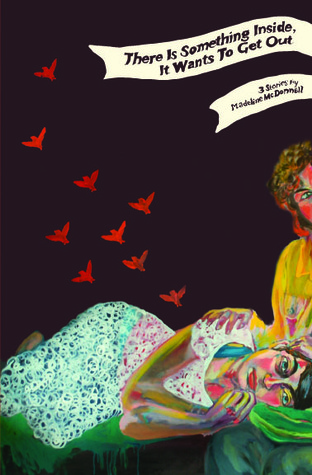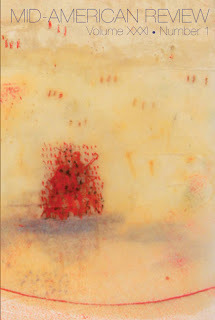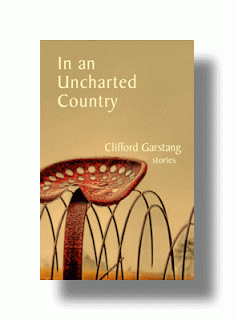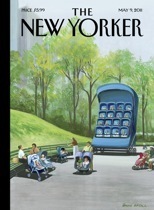Clifford Garstang's Blog, page 132
May 9, 2011
Short Story Month 2011: Ploughshares -- Lynne Tillman (#ssm2011)
 The story today is "Tiny Struggles" by Lynne Tillman, from the current issue of Ploughshares (Guest Editor Colm Tóibín).
The story today is "Tiny Struggles" by Lynne Tillman, from the current issue of Ploughshares (Guest Editor Colm Tóibín).Tiny, a former Soaps actor, has moved to a smaller town--he thinks of it as the country--three hours from the city. The town, either on its way up or down, is a mix of old-timers and city refugees like Tiny, and Tiny can't be sure if he's welcome in the shops. With the neighbors on either side he is on a nodding acquaintance. And he finds that what people do in the "country" is spy on their neighbors. He notices that a young woman from one house seems to be conducting an affair with a young man from another house.
Meanwhile, Summer becomes Fall--Tiny observes that change is constant--and he realizes he might need to find work soon. Or not: he might fall in love, he might win the lottery.
When the weather turns cold, the girl next door is kicked out of the house by her family, and she and the boy hint that maybe Tiny could take her in. But he can't. Or won't. And then the girl goes away.
This is what passes for struggle away from the city, apparently. But that's all there is to it.
If I had to guess what Guest Editor Tóibín found of interest in the story it would have to be the bar where Tiny goes: "Tiny usually needed an incentive and took a seat at the long, white marble-topped bar. The only person he'd ever met, down one end, was a solitary, bookish man who dressed up as James Joyce, so Tiny forgot his name because he unfailingly thought, James Joyce." Otherwise, I'm not sure . . .[image error]
Published on May 09, 2011 11:37
May 8, 2011
Short Story Month 2011: The Kenyon Review -- Theodore Wheeler (#ssm2011)
 Here's yet another 10-year-old protagonist--even though I don't love the kid's perspective, maybe I ought to give it a try myself. It seems popular with other editors.
Here's yet another 10-year-old protagonist--even though I don't love the kid's perspective, maybe I ought to give it a try myself. It seems popular with other editors.Actually, in Theodore Wheeler's "How to Die Young in a Nebraska Winter" (in the current issue of The Kenyon Review), there's a hint of retrospection. So we don't really see the narrator--he's simply looking back on something that happened when he was a kid, which allows Wheeler to jump forward in time a little to resolve his story.
Mikey and Todd wake up early in the room they share. Their father, Charlie, is getting ready for work, but instead of leaving he comes into their room to tell them that Brandon has died. Brandon, it turns out, is Charlie's first born, a child he fathered when he was in law school with a woman he had no intentions of marrying. He's been good to Brandon all this time--the boy was fifteen--and Brandon has spent a lot of time with Mikey and Todd on family vacations, summer and weekend visits. And there is a suggestion that Charlie has a different relationship with Brandon than he does with Todd and Mikey--closer.
The boys go with their father to the funeral, where Brandon's mother becomes hysterical, attacking Charlie. Later, Mikey's mother explains to him the special bond between a mother and child, and that she needed drugs to calm down. Mikey asks "Is it a cheat?" And then: "Just a little cheat, right? Because no one wants to see a kid die. It's too sad to see it through the mom's eyes." But his mother elaborates: "It's not that we don't want to see it. More like, we don't want it to exist."
And then the ending, perhaps the most interesting part of the story, shows Charlie's reaction to Brandon's death. Because if there's a special bond between a mother and her child, there's also a special bond between the father and his son, especially his first born.[image error]
Published on May 08, 2011 05:45
May 7, 2011
Short Story Month 2011: There is Something Inside, It Wants to Get Out by Madeline McDonnell (#ssm2011)
 Until now, my Short Story Month 2011 contributions have been from literary magazines, and I've got plenty more of those to talk about for the rest of the month. But today I'll do something different by presenting a press new to me and an author new to me, because I suspect we'll be hearing more about both.
Until now, my Short Story Month 2011 contributions have been from literary magazines, and I've got plenty more of those to talk about for the rest of the month. But today I'll do something different by presenting a press new to me and an author new to me, because I suspect we'll be hearing more about both.Madeline McDonnell's There is Something Inside, It Wants to Get Out, published by Rescue Press, is a slim collection of just 3 stories. But they're all good ones, and I enjoyed this book very much.
The first story--my favorite, I think--is "Wife," about a woman named Wednesday--which is her first problem--who is dominated by her mother--that's her second problem. She is engaged to Ben, although he has a hard time telling her mother, who doesn't like Ben much and also doesn't think much of the institution of marriage ("Marriage is legalized rape, nothing more."). But Wednesday doesn't seem terribly interested in her own career in academia. So what's left for her?
The second story is "Physical Education" about a teen cancer patient who is returning to school and her gym classes, but whose father also shoes up to keep an eye on her. Because the pipe-smoking gym teacher seems uninterested, the father basically takes over--becoming both coach and participant in the games of volleyball and basketball.
The final story, "Trouble," profiles a young woman who finds herself pregnant for the second time. The first time, when she was a teenager, ended in an abortion. This time, she's married, but it doesn't seem that she's any better equipped to handle than she was when she was a child. Among other things, she has this fondness for running her car into other cars . . .
It's an excellent little collection, beautifully written, that explores dark emotions and personal trauma.[image error]
Published on May 07, 2011 08:01
May 6, 2011
Short Story Month 2011: Mid-American Review -- Kevin Wilson (#ssm2011)
 I'm a big fan of Kevin Wilson and his work, so I was thrilled when I picked up the latest Mid-American Review and saw that it included one of his stories. (We were delighted to publish Kevin's "Another Little Piece" in Prime Number Magazine last year.)
I'm a big fan of Kevin Wilson and his work, so I was thrilled when I picked up the latest Mid-American Review and saw that it included one of his stories. (We were delighted to publish Kevin's "Another Little Piece" in Prime Number Magazine last year.)"Intergenerating" is classic Kevin Wilson. The story features Boyd, an unemployed (directionless, clueless) man who lives with his mother and seems to spend his days sleeping. His mother, on the other hand, is wealthy, having inherited everything from her late, philandering husband, including a sizable settlement from the airline responsible for the crash that killed him. One day Boyd is awoken by a call, and all of his neuroses are revealed: "He had to sound like a man caught at his home by chance at eleven o'clock a.m., perhaps rushing home from his fairly lucrative job to eat lunch with the wife, who no longer had to work because of his aforementioned, though still detail-lacking, lucrative job."
But there is no wife and no job. The call is an invitation to join something called Older/Wiser Bother and Sister Foundation and become a mentor to a disadvantaged youth. Despite his mother's objection--she's certain OWBSF is a fraud--Boyd joins. He goes through a brief training program, learns the ten commandments of being a mentor, and makes arrangements for his first outing with Raul, his mentee. Needless to say, it doesn't go well, but the story gets funnier and crazier as it goes on.
I highly recommend this one if you can get your hands on the current MAR issue.[image error]
Published on May 06, 2011 09:39
May 5, 2011
Short Story Month 2011: One Story -- Ethan Rutherford (#ssm2011)
 I'm not sure why it is, but I don't love stories about kids. I just don't. So I probably didn't come to "Summer, Boys" by Ethan Rutherford, in Issue Number 145 of One Story, with the right frame of mind.
I'm not sure why it is, but I don't love stories about kids. I just don't. So I probably didn't come to "Summer, Boys" by Ethan Rutherford, in Issue Number 145 of One Story, with the right frame of mind.Which is not to say I didn't like it. I think the writing is great. I love the sentences, some of which are these great sprawling things of the sort that I like to write. And I also love the point of view, which is unique in my reading experience. (It's basically simultaneously from the point of two boys, best friends, who have just finished fifth grade.) The issues the two main characters face, while important to 10 year olds, don't greatly interest me.
In any case, these two boys--we don't get their names because they're basically interchangeable--spend all their time together at one boy's house. They live Seattle and are big football fans generally and Brian Bosworth fans in particular. But in this transitional summer, something happens. They spend a little time with an older boy, a cousin, who is a skateboarder, and so they abandon their bikes in favor of skateboards. The older boy also doesn't care about Bosworth, or football, and while he enjoys a cartoon the boys like (Godzilla stomps on Bambi), he says he's got a movie to show them and will return with it the next day. When the older boy doesn't show up, the younger boys don't know what to do with themselves. Eventually, one of the boys goes home and they are separated for a few days--their first time apart. The separation is painful, but finally it ends and they watch the older boy's movie--which appears to be porn. ("Both of them know what they are watching, neither of them knows whether they should be watching it.") But the boys don't even hear the movie, or the approach of the father coming down the stairs. They hear only each other: "One friend is clumsily showing the other--the other, who knows nothing of himself, except that he wants to be included. There is milky, hairless skin. . . There is a flaccid taste, the bending of limbs, and a strange, tongue-less kiss."
Okay, then. A couple of kids discovering their bodies and cementing their friendship. I wish there were more to it.[image error]
Published on May 05, 2011 11:10
May 4, 2011
Short Story Month 2011: New Letters -- Abby Frucht (#ssm2011)
 "Tamarinds" by Abby Frucht
"Tamarinds" by Abby Frucht is in the current issue of New Letters (Volume 77, No. 1).
is in the current issue of New Letters (Volume 77, No. 1).The Help
 it isn't, but the story is about the relationship between a young girl and her black housekeeper, in this case a woman named Cynthia, who comes from the islands. The housekeeper is from another planet, according to the girl's younger brother, and, furthermore, her children when they reach the age of ten were changed into tamarinds by witches. And, he tells her, tamarinds on Cynthia's island aren't fruits, they're animals about the size of koala bears. Unfortunately, the girl doesn't seem to be bright enough, or confident enough, to argue with her brother.
it isn't, but the story is about the relationship between a young girl and her black housekeeper, in this case a woman named Cynthia, who comes from the islands. The housekeeper is from another planet, according to the girl's younger brother, and, furthermore, her children when they reach the age of ten were changed into tamarinds by witches. And, he tells her, tamarinds on Cynthia's island aren't fruits, they're animals about the size of koala bears. Unfortunately, the girl doesn't seem to be bright enough, or confident enough, to argue with her brother.In the background of the story, Robert Kennedy has been killed. But in the girl's terminology, he was running for "Emperor of the Second Cycle of our planet"--which sounds like something she's picked up from her little brother. Only the brother is smart enough to solve Cynthia's riddles, such as "how many coconuts put in an empty sack."
The family treats Cynthia reasonably well, although the mother doesn't seem to be willing to allow her to go to mass on Sunday--she's too helpful with brunch--but other than that what bothers Cynthia is being separated from her family, especially her daughter Wanda.
The climax of the story arrives with a knock on the door that turns to banging and kicking. The narrator sees that the glass of the door has shattered and that her younger brother's "Vintage Monogram Big Deuce Ford Roadster"--a model, but the boy's most impressive--is in pieces on the lawn. The police arrive (to solve the mystery of a murdered hobby-model?) and ask questions. Why would someone do this? The mother seems to be thinking that the problem is owing to her having a black maid, but she doesn't actually say that.
The story leaves more unanswered than I'm comfortable with. Did the narrator have something to do with the destruction of the model? Did the boy himself do it? And who kicked in the door? The ending itself, though, is great. The narrator reflects on the "spell-like tissue paper" on which she'd written a birthday greeting to her brother, and this recalls the witches who turned Cynthia's children into tamarinds, as if our narrator expects this to happen to her brother.
It's an odd story, but well done. I'm just not sure what to make of it.
Published on May 04, 2011 12:09
May 3, 2011
Short Story Month 2011: Interview with Christine Schutt (#ssm2011)
 I love Christine Schutt's short stories. So, in honor of Short Story Month 2011, and the fact that today is Christine's birthday, I thought I'd share a link to an "interview" I conducted with Christine for Prime Number Magazine last year, in which she talks about creativity.
I love Christine Schutt's short stories. So, in honor of Short Story Month 2011, and the fact that today is Christine's birthday, I thought I'd share a link to an "interview" I conducted with Christine for Prime Number Magazine last year, in which she talks about creativity.Enjoy!
Interview with Christine Schutt
Published on May 03, 2011 14:39
Short Story Month: Book Giveaway! #ssm2011
 Today is 5/3, which means that it's National Press 53 Day. And to celebrate, Press 53 is giving away free books, including one copy of my linked short story collection, In an Uncharted Country.
Today is 5/3, which means that it's National Press 53 Day. And to celebrate, Press 53 is giving away free books, including one copy of my linked short story collection, In an Uncharted Country.All you have to do is go to Press 53's Facebook Page and leave a comment in the appropriate post. The publisher will select the winners from among the comments. So, go forth and comment!
Published on May 03, 2011 10:10
Short Story Month 2011: The New Yorker -- Donald Antrim (#ssm2011)
 May 9, 2011: "He Knew" by Donald Antrim
May 9, 2011: "He Knew" by Donald AntrimWhatta ya know? A story about New York in The New Yorker!
This one involves a washed up comedic actor and his second, younger, wife. He's, apparently, bi-polar, and she's, apparently, neurotic. He's taking anti-depressants, among other things, and she's taking valium. Lots of valium. On the day in question—which happens to be Halloween—Alice and Stephen (for some reason we don't get their names for the first couple of pages) are feeling good and they're out walking and shopping. It's what they like to go when Stephen is feeling up to leaving the house (or getting dressed, for that matter). He likes to buy things for her, but he also likes to buy things for her. (What they buy are unnecessary clothes, so they can dress their parts, not unlike the Halloween costumes they encounter on the street.)
As the day goes on, Stephen's mind washes over his ex-wife, a prostitute, a woman he had an affair with, a woman he didn't have an affair with, and his declining resources, as well as generally contemplating his problems: "The problem—the problem—was that he was no longer getting cast in the comic roles that had become, over years of acting in plays and, for a brief spell, on television, his strong suit." But then he realizes that isn't the root problem, or yes, in a way it was.
He and Alice have an argument over nothing. They both have something of a meltdown and drop into a coffee shop for a bite to eat and their meds, although while Stephen is in the restroom Alice takes a few more for good measure, which makes her a little wobbly when they head out to the street for more shopping. Then, in the middle of the story, came a nice surprise for me. Stephen is reflecting on the fact that they're both from North Carolina, although they met in New York, and they had considered a return visit:
"For the first year or two of their relationship, they'd discussed plans to rent a convertible and drive south together through New Jeresey and Delaware and Maryland, continuing around Washington and on through the Shenandoah Valley, in Virginia—there was a nineteenth-century inn near Staunton that he'd read about in a food magazine and wanted to spend a night or two at—and then from there into the southerly regions of the Blue Ridge . . ."Staunton! (There are some cool old inns around here, and practically everything is nineteenth century.)
But the meltdown continues—it slows briefly while Stephen interacts with a young couple and their costumed child, and the wife recognizes Stephen from television—until Alice finally renews her accusation that Stephen had an affair while Alice was in the hospital (after her suicide attempt) and then runs off. Now HE takes a couple of valium and then finds their favorite bar, where everyone else is in costume. But she joins him, they go home and he puts her to bed, where he fantasizes that he'll get his career back on track, they'll have a child together.
So what's it all about? Clearly, Stephen and Alice are costuming themselves, or at least Stephen is doing it for the both of them. He reflects on his costume experiences as a young actor, and he comments to the child he encounters that her lion costume makes her surprisingly—because she's a girl—ferocious. The costumes aren't just what they wear, I suppose—the meds are part of it, as are the lies they tell themselves. This is not a couple with a happy future.
By the time I got to the end of the story, I wasn't sure what the title referred to. But one nice thing about the Kindle is that you can run a search, and I found just one use of "he knew" in the story. It's near the end, when Alice has again accused Stephen of having an affair: "Now he could hear and feel her terror, and he, too, began to feel frightened, because he knew here this fight could take them." And I think that's the point. He knows perfectly well where they're headed, and since there's nothing he can do about it, they might as well dress up and take their meds.
Published on May 03, 2011 05:52
May 2, 2011
Short Story Month 2011: New England Review -- Kathleen Ford (#ssm2011)
 New England Review has long been one of my favorite magazines. My story of the day is "Man on the Run" by Kathleen Ford, in the current issue, Volume 31, No. 4.
New England Review has long been one of my favorite magazines. My story of the day is "Man on the Run" by Kathleen Ford, in the current issue, Volume 31, No. 4.The story reminds me of another story I've read in the past couple of years, the name of which escapes me. That story also involved older siblings living together, increasingly unable to care for themselves. Certainly the ending of this story distinguishes it, however, and despite the slight familiarity I liked the story very much.
Rosemary and Betty are elderly sisters who live together in upstate New York. They come from a large Irish family and seem to have outlived many of their relatives, including Rosemary's beautiful daughter Moira, killed in a car accident 50 years ago, an accident for which Rosemary still blames herself.
On this occasion, though, the sisters have taken in their great-niece Linda, the victim of domestic abuse. Linda, like Moira, has beautiful hair, and Rosemary, although she can't really manage stairs any longer, makes the difficult climb in order to watch Linda while she sleeps. When Linda comes down for breakfast, Rosemary observes the extent of the beating she has taken, and imagines what more damage might be hidden by the girl's robe. Along the way, we learn that it's difficult for the sisters to get out. There used to be a student occupying a nearby apartment to did chores for them, but he's moved on and they haven't found a replacement. While the exterior of the house is taken care of--preserving their investment--the interior is falling apart: cracks in the plaster, peeling wallpaper. We also learn that there isn't money to do much more.
The arrival of Linda also brings to mind--for Rosemary, at least, although Betty was too young at the time--another "man on the run" their family took in back in 1919, a leader of the Easter Rising of 1916, in Ireland.
And then the abusive boyfriend shows up, discovering Linda's location through the carelessness of her sister. Confrontation ensues.
Although I liked the story a lot, I don't know that it does enough with the reference to the earlier fugitive the McGuire family harbored. And in the climax of the story, where Tommy, the boyfriend, confronts Linda and the sisters, a gun goes off. I won't say what happens, but I do have a question. If it is true, as we've learned from Chekhov, that a gun hanging over the mantel in the first act must be fired in the last act, isn't it also true that if a gun is fired in the last act it must be hanging over the mantel in the first? That is, isn't it too convenient that the gun shows up in the end? (It isn't Tommy's.) Or perhaps--and this seems both plausible and reasonable--the author realized that if readers saw a gun early in the story we'd fully expect it to be fired in the end. (I know I would.) So, in fact, Ford may just be working counter to expectations, which is probably a good thing.
These are small quarrels. It's a very good story.
Published on May 02, 2011 05:35



